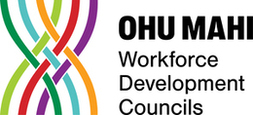Workforce Development Councils (WDCs)
Ngā Ohu Mahi
Workforce Development Councils (WDCs) ensure the vocational education system meets industry needs and gives a stronger voice to Māori business and iwi development. There are six WDCs and their responsibilities include setting standards, developing qualifications and helping shape the curriculum of vocational education.
Workforce Development Councils (WDCs) ensure the vocational education system meets industry needs and gives a stronger voice to Māori business and iwi development. There are six WDCs and their responsibilities include setting standards, developing qualifications and helping shape the curriculum of vocational education.
The work of WDCs means employers – including Māori business owners – can be confident that vocational education graduates are ready for work, and that the future skills needs of their industry will be addressed by the vocational education system.
WDC core functions
- WDCs work with their industries to develop and maintain a strategic view of the skills their industries require now and in the future. They translate these needs into expectations of what the vocational education system will deliver. Education and training providers – Te Pūkenga, private training establishments (PTEs) and wānanga – are expected to respond to these expectations.
- WDCs set standards, develop qualifications and help shape the curriculum of vocational education. They moderate assessments against industry standards and, where appropriate, set and moderate capstone assessments at the end of a qualification.
- WDCs endorse programmes that lead to industry qualifications which are then approved by the New Zealand Qualifications Authority (NZQA). This includes programmes that are work-based (such as apprenticeships), on-campus or online.
- WDCs provide advice to the Tertiary Education Commission (TEC) on investment in vocational education. This advice is timed to inform the TEC investment cycle.
As the voice of industry, WDCs primarily work with industries and employers in their sectors, including Māori industry and iwi businesses. WDCs also work and collaborate with each other.
WDCs engage or partner with Regional Skills Leadership Groups (RSLGs), TEC, NZQA, Centres of Vocational Excellence (CoVEs) and providers (wānanga, private training establishments (PTEs) and Te Pūkenga).
WDCs also engage with a range of parties to help inform and prioritise their work. These include the Ministry of Education, advocacy groups, learners, Taumata Aronui, government agencies and schools.
The six WDCs

Waihanga Ara Rau (Construction and Infrastructure) Workforce Development Council represents industries including Construction, Concrete, Plumbing, Infrastructure, Water, Gas, Electricity, Telecommunication, and Roading.

Toi Mai Workforce Development Council represents industries including Creative, Technology, Entertainment, Hairdressing and Barbering, Makeup Artistry, Skincare, Journalism, Radio and Television Broadcasting, Gambling, and Sports & Recreation.

Toitū te Waiora (Community, Health, Education and Social Services) Workforce Development Council represents industries including Care Services, Disability Services, Education and Education Support Services, Funeral Services, Health Services, Public Order Safety, Regulatory Services, Skin and Nail Therapy Services, Social Services, and Urban Pest Control.

Hanga-Aro-Rau (Manufacturing, Engineering and Logistics) Workforce Development Council represents industries including Manufacturing, Processing, Extractives and Drilling, Transport, Postal, and Warehousing.

Muka Tangata (People, Food and Fibre) Workforce Development Council represents industries including Dairy, Sheep and Beef, Other Livestock, Arable, Horticulture, Fishing, Seafood Processing, Winemaking, Aquaculture, Livestock Farming, Sports Turf Management, and Forestry.

Ringa Hora (Services) Workforce Development Council represents industries including Advisory Services, Aviation, Cleaning Services, Business Services, Contact Centres, Financial Services, Hospitality, Local Government, Real Estate, Retail, Security Services, State Sector, and Tourism and Travel.

The overarching brand for all six WDCs is Ohu Mahi.